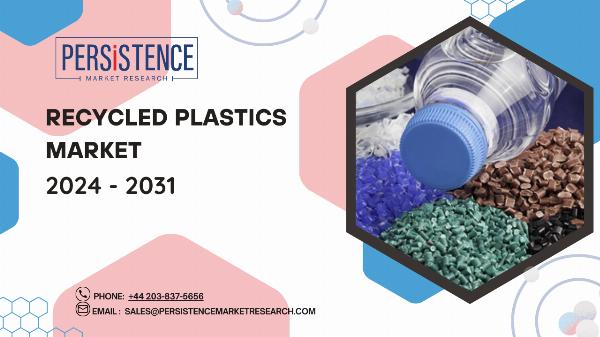Technologies Used in Plastic Recycling

Strong 8k brings an ultra-HD IPTV experience to your living room and your pocket.
Plastic recycling is a crucial component of sustainability efforts aimed at reducing plastic waste and conserving natural resources. As the demand for recycled plastics continues to grow, innovative technologies are being developed and implemented to enhance the efficiency and effectiveness of the recycling process. This article explores the various technologies used in plastic recycling, highlighting their roles and contributions to the industry.
For More Industry Insight: https://www.persistencemarketresearch.com/market-research/recycled-plastics-market.asp
1. Mechanical Recycling
Mechanical recycling is the most common method employed in the plastic recycling industry. This process involves physically breaking down plastic waste into smaller pieces, which are then cleaned, sorted, and reprocessed into new materials. The steps typically include:
Collection and Sorting: Plastics are collected from various sources, including households and businesses. They are then sorted based on their resin types to ensure compatibility during processing. Advanced sorting technologies, such as near-infrared (NIR) spectroscopy and optical sorting, help identify and separate different types of plastics accurately.
Shredding and Grinding: Once sorted, the plastics are shredded into small flakes or granules. This size reduction facilitates easier handling and processing.
Washing and Cleaning: The shredded plastic is washed to remove contaminants, such as labels, dirt, and other impurities. This step is essential to ensure the quality of the recycled material.
Extrusion: After cleaning, the plastic flakes are melted and extruded into pellets. These pellets can be used to manufacture new products.
Mechanical recycling is effective for certain types of plastics, particularly polyethylene (PE) and polypropylene (PP), but it has limitations in terms of the degradation of the polymer chains, which can affect the quality of the final product.
2. Chemical Recycling
Chemical recycling, also known as advanced recycling, involves breaking down plastics into their chemical building blocks through chemical processes. This method can handle a wider variety of plastics, including those that are challenging to recycle mechanically. Key processes in chemical recycling include:
Pyrolysis: In this process, plastics are heated in the absence of oxygen, breaking them down into smaller hydrocarbons. The resulting products can be refined into fuels, oils, or new plastics. Pyrolysis is particularly effective for mixed plastics that cannot be sorted easily.
Gasification: Similar to pyrolysis, gasification involves converting organic materials into synthesis gas (syngas) through high-temperature processes. This syngas can then be converted into chemicals or fuels.
Depolymerization: This method involves breaking down polymers into their monomers, which can be repolymerized to create new plastics. Depolymerization is especially useful for recycling PET and polyamides, as it can restore the original properties of the plastic.
Chemical recycling has the advantage of producing high-quality recycled materials that can be used in various applications. However, it often requires significant energy input and investment in advanced technologies.
3. Solvent Recycling
Solvent recycling involves dissolving plastics in solvents to separate them from contaminants. This method is particularly effective for certain types of plastics, such as polystyrene (PS) and polyvinyl chloride (PVC). The process generally includes:
Dissolution: Plastics are treated with solvents that dissolve them, allowing for the removal of impurities and contaminants.
Separation: After dissolution, the solution can be filtered or centrifuged to separate the dissolved plastic from solid contaminants.
Recovery: The dissolved plastic is then precipitated out of the solution, dried, and processed into new materials.
Solvent recycling can yield high-purity recycled plastics but requires careful management of solvents to minimize environmental impact.
4. Biotechnological Approaches
Recent advancements in biotechnology have introduced innovative methods for plastic recycling. These approaches utilize microorganisms and enzymes to break down plastics into their constituent parts. Some key developments include:
Enzymatic Recycling: Researchers are developing enzymes capable of degrading plastics, such as PET, into their monomers. These enzymes can break down plastic waste more efficiently than traditional methods, offering a sustainable solution for recycling.
Microbial Degradation: Certain microorganisms can naturally degrade plastics in their environment. By harnessing these organisms, researchers aim to enhance the biodegradation of plastic waste, potentially leading to new methods of recycling.
Biotechnological approaches are still in the experimental phase, but they hold promise for addressing the plastic waste crisis in an environmentally friendly manner.
5. Energy Recovery Technologies
While not a recycling method in the traditional sense, energy recovery technologies play a role in managing plastic waste that cannot be recycled. These processes involve converting plastic waste into energy, helping to mitigate the environmental impact of discarded plastics. Key methods include:
Incineration: Controlled combustion of plastic waste generates energy in the form of heat and electricity. However, this method raises concerns about emissions and air quality.
Waste-to-Energy (WtE): This approach involves converting plastic waste into fuels or energy through various processes, such as pyrolysis or gasification. WtE technologies aim to recover energy from non-recyclable plastics while minimizing landfill use.
Note: IndiBlogHub features both user-submitted and editorial content. We do not verify third-party contributions. Read our Disclaimer and Privacy Policyfor details.


